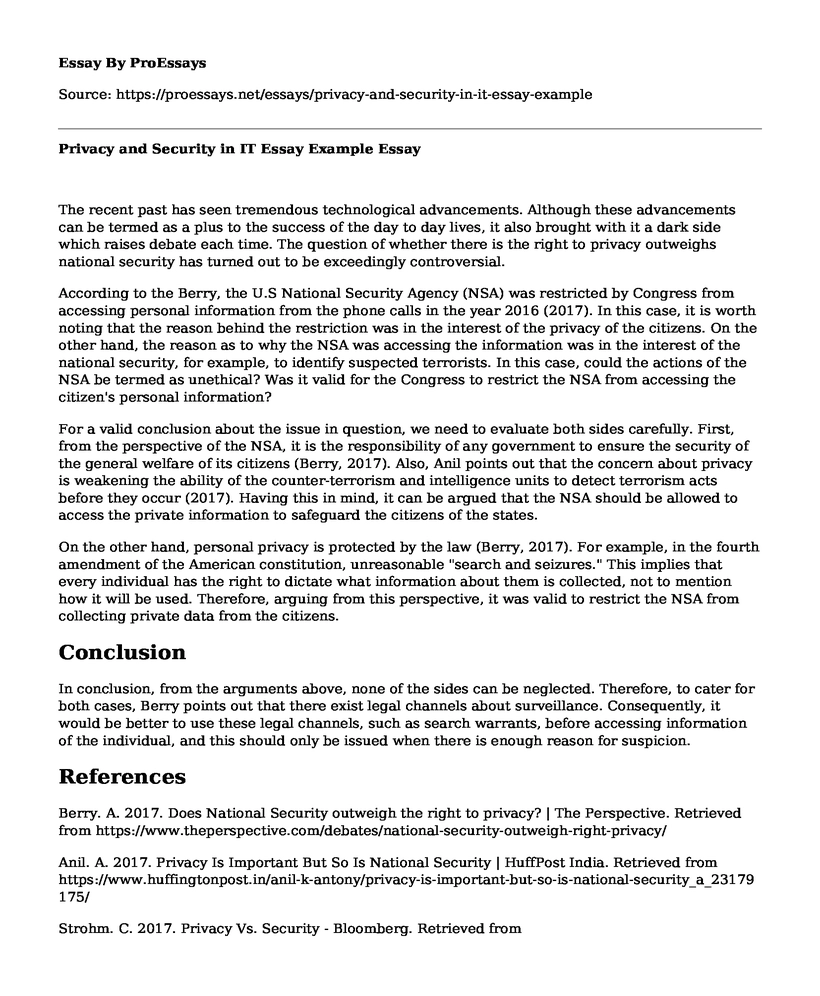The recent past has seen tremendous technological advancements. Although these advancements can be termed as a plus to the success of the day to day lives, it also brought with it a dark side which raises debate each time. The question of whether there is the right to privacy outweighs national security has turned out to be exceedingly controversial.
According to the Berry, the U.S National Security Agency (NSA) was restricted by Congress from accessing personal information from the phone calls in the year 2016 (2017). In this case, it is worth noting that the reason behind the restriction was in the interest of the privacy of the citizens. On the other hand, the reason as to why the NSA was accessing the information was in the interest of the national security, for example, to identify suspected terrorists. In this case, could the actions of the NSA be termed as unethical? Was it valid for the Congress to restrict the NSA from accessing the citizen's personal information?
For a valid conclusion about the issue in question, we need to evaluate both sides carefully. First, from the perspective of the NSA, it is the responsibility of any government to ensure the security of the general welfare of its citizens (Berry, 2017). Also, Anil points out that the concern about privacy is weakening the ability of the counter-terrorism and intelligence units to detect terrorism acts before they occur (2017). Having this in mind, it can be argued that the NSA should be allowed to access the private information to safeguard the citizens of the states.
On the other hand, personal privacy is protected by the law (Berry, 2017). For example, in the fourth amendment of the American constitution, unreasonable "search and seizures." This implies that every individual has the right to dictate what information about them is collected, not to mention how it will be used. Therefore, arguing from this perspective, it was valid to restrict the NSA from collecting private data from the citizens.
Conclusion
In conclusion, from the arguments above, none of the sides can be neglected. Therefore, to cater for both cases, Berry points out that there exist legal channels about surveillance. Consequently, it would be better to use these legal channels, such as search warrants, before accessing information of the individual, and this should only be issued when there is enough reason for suspicion.
References
Berry. A. 2017. Does National Security outweigh the right to privacy? | The Perspective. Retrieved from https://www.theperspective.com/debates/national-security-outweigh-right-privacy/
Anil. A. 2017. Privacy Is Important But So Is National Security | HuffPost India. Retrieved from https://www.huffingtonpost.in/anil-k-antony/privacy-is-important-but-so-is-national-security_a_23179175/
Strohm. C. 2017. Privacy Vs. Security - Bloomberg. Retrieved from https://www.bloomberg.com/quicktake/privacy-vs-security
Cite this page
Privacy and Security in IT Essay Example. (2022, Sep 22). Retrieved from https://proessays.net/essays/privacy-and-security-in-it-essay-example
If you are the original author of this essay and no longer wish to have it published on the ProEssays website, please click below to request its removal:
- Customers Privacy Intrusion
- Box Station - Analysis of Vulnerabilities
- The Future of Cyber Warfare - Paper Example
- Essay Sample on Mobile Application Architecture
- Essay Example on Healthcare Innovations From Banking, Retail and Tech Sectors
- China's Tech Innovation: Race to the Top of the Digital Space - Research Proposal
- Designing and Developing Metasploit for the Cyber Security







